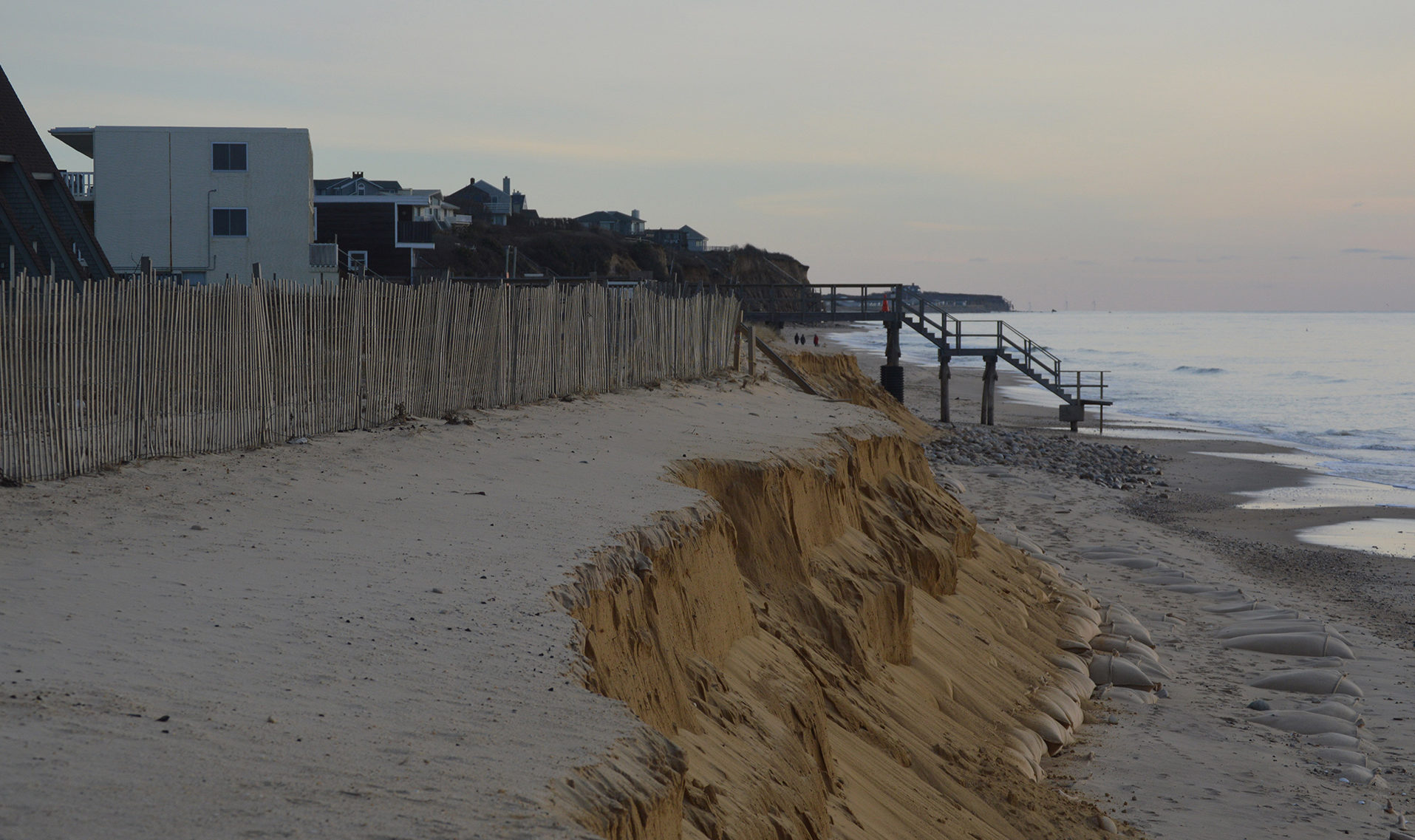Fight Or Flight From The Ocean In Montauk?


Choosing between fight or flight from the Atlantic Ocean in downtown Montauk was on the minds of many speakers at the public hearing concerning the Montauk hamlet study held by the East Hampton Town Board on December 6.
“This plan isn’t really a plan at all, but rather a guiding vision,” Laura Tooman, the head of the Concerned Citizens of Montauk, said about the study, which has been a couple of years in the making, and is available online. That is how the East Hampton Town Planning Department has presented the studies, which were prepared under the guidance of several outside advisors, headed by the consulting firm of Dodson and Plinker.
The December 6 hearing was the fifth and final one, with each of the town’s five hamlets being the focus of one meeting. The final product will be added to the town’s comprehensive plan, which was last updated in 2005.
“It is going to take a long time,” Tooman said, adding that action must be taken now, particularly when it comes to erosion.
About 20 speakers took to the podium, and at least one took exception to the methodology used in the study. Bonnie Brady told the town board that the study was not inclusive enough, and did not reflect the views of many year-round Montauk residents. She also was critical of the Army Corps of Engineers’ work on the Atlantic Ocean beaches in downtown Montauk, saying it had destroyed the dunes and the beach. “Montauk is tired of being a guinea pig,” she said.
Carl Irace spoke, representing the advocacy group Defend H2O. He was critical of both the current practice of replenishing the sand on beaches, and the idea of funding that practice by creating a special tax district in downtown Montauk. “The public has heard a lot about nourishment plans that would take sand from offshore sites for downtown beaches,” he said. “The public has also heard a lot about an erosion control tax district. We are here to disavow the notion that beach nourishment is a suitable solution. Funding beach nourishment through an erosion control district is an enabler of that unsuitable solution.” He called the whole process “a false panacea,” adding that “such a district would commit substantial public money to protect private interests.”
He called for an orderly retreat from the rising sea level in downtown Montauk. “Either the buildings are removed from harm’s way voluntarily, without destruction and loss of property, or Mother Nature takes it by force, with destruction, loss of property, or worse,” Irace said.
Allen Axelowitz presented a different point of view. He told the board that his family had purchased a couple of units many years ago in what is now known as the Montauk Blue Hotel, which faces the ocean. “To take us away is unfair. Our kids grew up there,” he said. “I want my children’s children to grow up there. To just take us away is unacceptable.”
Kevin McAllister, of Defend H2O, spoke about rising sea levels, saying that in the past 40 years, sea levels have risen four inches, but that in the next 40, that rise is going to accelerate to anywhere between 11 and 30 inches. He called for the use of the Community Preservation Funds to purchase what he called the “front row” of motels and resorts in downtown Montauk.
Thomas Muse spoke about the erosion control tax district in Montauk, calling the condition of the beaches a “dangerous situation.” He said that he had been on the beach that morning, walking his dog, as he often does, and that the erosion of sand brought to the beach to replenish it has created a 15-foot tall cliff of “brown sand.” Photographs show that, not only have many tons of sand dumped to nourish the beach again washed away, but the giant sandbags installed by the corps, at the town’s expense, are now exposed.
Chris Carillo told the board he was speaking on behalf of the 90 or so homeowners in the Surfside Estates Association, which is just east of downtown Montauk. He said their deeded beach access is no longer safe to use, and that the condition of the beaches “needs to be addressed immediately.”
Immediacy concerning the beachfront was a frequent refrain for speakers, despite the long-term nature of the hamlet study.
Andrew Brosnan of the Surfriders Foundation said that the Army Corps beach revetment project, which was built at federal expense in 2015, and is maintained at town expense, exacerbated erosion all along the beach, and called for a “managed retreat” from the rising Atlantic.
Paul Fiondella read from the federal report on climate change released the day after Thanksgiving this year. He said that the report indicates that ocean warming will be at its worst in the Mid-Atlantic area of the country. He said the report “basically says we are a target for global warming, because things are happening faster than elsewhere.”
Henry Uhlein, who owns businesses and a marina in the dock area, said he would like more time to understand the study. “My property is for sale if anyone wants to buy it,” he said.
The board agreed to keep the hearing open for 30 days, to allow members of the public to weigh in in writing on any of the hamlet studies.
t.e@indyeastend.com


